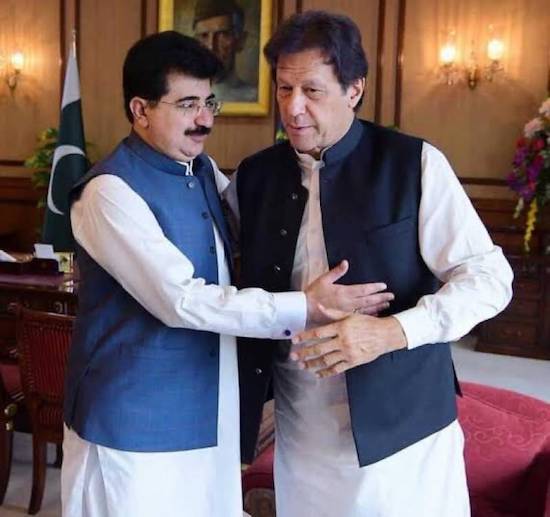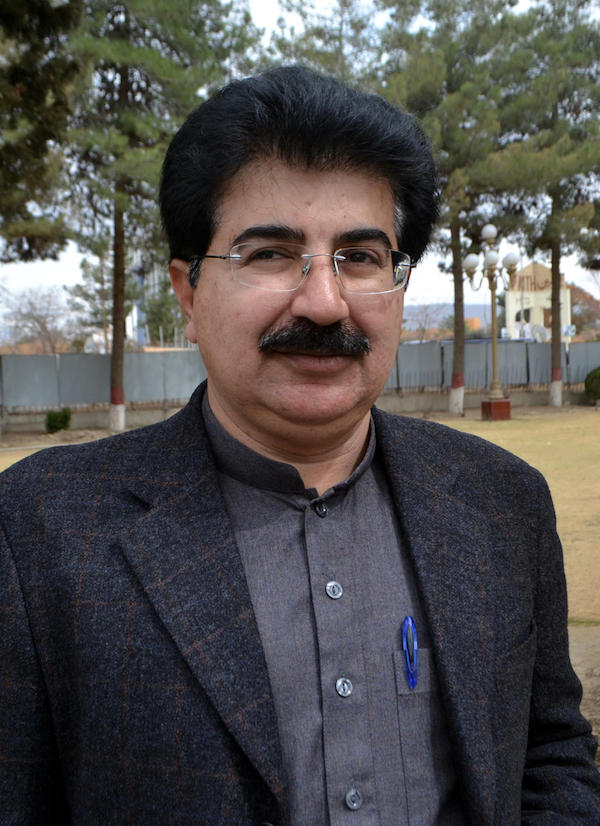The ‘established’ political parties of Pakistan today have mainly dynastical family rule like that of Z.A. Bhutto, his descendants (and opportunistic adherents through marriage like Asif Zardari), that of Maulana Mufti Mahmood, Baccha Khan’s family and more lately of Nawaz Sharif’s, feudal to the core. The exceptions were Jamaat-e-Islam (JI) and the MQM. The MQM became hostage to the cult of one of the most ugly murderous personalities in the history of Pakistan. Trust the British to look the other way when it suits them to harbour such a monster in their midst! Hopefully Brexit will mean he is also exit-ted to Pakistan, many are anxiously awaiting his arrival!
Imran Khan’s electoral victory is a challenge to the political system created and run by them for the last fifty years or so. These crude interests using political activity for personal and the family’s enrichment is conveniently hidden behind lofty speeches and slogans while perjuring themselves up to their eyebrows (in Mariam’s case her eyelashes) A majority of the Pakistani people do not understand the British concept of “parliamentary democracy” being used as a convenient tool to keep these rapacious families in power, fighting elections against each other but sharing power when so needed. The ‘Charter of Democracy’ was nothing else but a strategic ploy to gain and retain power. Thereafter the PPP and PML(N) played musical chairs in the last decade unity against anybody trying to change the system. On the “you scratch my back” and “I scratch yours” principle.
‘The 2008-2018 lost decade’ saw the economy suffering with no development taking place but the two families enriching themselves by plundering the national wealth in turn. This family-based party system brought with itself blatant nepotism, selling of jobs for money and political loyalty, other forms of cheating, lying and manipulating, illegal transfer of property, etc. The history of selective ‘accountability’ under those two parties using it for political and personal revenge gave accountability a bad name.
Our military rulers were right in their assessment of Pakistani democracy, where they went wrong was in trying to perpetuate their individual rule. Ayub Khan maintained that British-type democracy did not work in Pakistan, however his ‘Basic democracy’ system was only designed to keep him in power. Despite that Ayub’s economic developmental record in the sixties made Pakistan an exemplary model developing country. Zia ul Haq exposed the cheating and manipulative ‘democracy’ that Z.A. Bhutto installed (the 1973 Constitution was made ineffective hours after it was enacted) but made a “holy” (pun intended) mess of foisting his version of Islam on Pakistan. The aftershocks of his mistaken efforts to islamise law and of jihadi ideology still remain with us. Gen Musharraf came to power with a clear agenda of political reform and real accountability but he stumbled over his own ego and ambitions. With Musharraf’s rule morphing into disaster, even the military had to finally admit that ruling a state was not their forte, this compromised their discipline and military effectiveness as well as their reputation for honesty and integrity. The NRO, a black law that Musharraf enacted to condone the politician’s plunder in a vain attempt to perpetuate his own rule, brought back the old menagerie of PPP and PML (N) for a decade.
Even though bereft of other political experience in governance. With Imran Khan we have a man without a feudal family background. Despite the support of the dubious ‘electables,’ Biradri and family, his government is more credible than all those before him. His rhetoric about all-encompassing reforms frightens the old guard so much they have become the best of friends to fight of this danger to their “manipulative democracy”. When casting doubt on the 2018 election results did not work, the only way to undermine its credibility was for Bilawal, in whom one had hopes despite his father, to be childish and call Imran Khan the ‘selected’ PM. For the sake of clarity, the PM has both been “elected” and “selected”, not only is he the people’s choice but in a first for Pakistan, he has the overwhelming support and adulation of the rank and file of the Armed Forces, the civil and military are visibly on one page.

Elected to the Senate as an independent candidate (not PTI) on general seat from Balochistan in 2018, Sanjrani became the 8th Chairman by receiving 57 votes out of total 103 votes. The old guard decided to go against the Sadiq Sanjrani and make the Senate a tool in the hands of the Sharif and Zardari families to whom “democracy” is a convenient camouflage to ensure their chancery. The vote of no-confidence to emasculate Parliament is certainly a victory for the ruling party. To be honest, Sanjrani seems to have been saved by the very means that Imran Khan and PTI came to eliminate. To ensure the failure of the vote of “no confidence” was democratically counter-productive but a necessity required to sustain Imran’s agenda to create a ‘Naya Pakistan’. The indirect mode of the Senate election is tailor-made for ‘horse trading’ i.e. buying and selling, influencing, coercing, etc. of votes. Senators do not vote their conscience for the country, their vote goes for what is good for themselves. Unless the Senate is elected through direct vote of the people, a majority of Senators will go to the highest bidder.
Maj Gen Asif Ghafoor DG ISPR refuted Mir Hasil Khan Bizenjo when he accused the DG ISI of manipulating the Senate vote. If Bizenjo is right Faiz Hameed ostensibly did this country two tremendous favours by (1) denying PML (N)/ PPP their aim to rescue totally corrupt leaders from jail and (2) taking control of one of the Houses of Parliament. Emasculating Parliament would have deepened the economic crisis created by them in the first place and the resultant chaos would instigate violent reaction in the streets. In any case the composition of the present Senate certainly does not reflect the democratic will of the people of Pakistan as exercised in the 2018 vote, its present constituent will is a mixture of the 2013 and 2018 vote. The 2013 vote in the Punjab was manufactured by PML (N) and in Sindh by the PPP. If the blatantly corrupt leadership of PML (N)/ PPP had succeeded they would have the capacity to blackmail the PTI Govt. In the present geo-political circumstances where we are not only being subjected to Hybrid Warfare by India but being provoked by their actions in Kashmir and along the LOC, that would have put Pakistan as a stable, sovereign country in great danger. The DG ISI’s job description requires him to protect national security at all costs across a number of internal and external crisis, particularly given the Indian machinations in the region. If the DG ISI did what he is being accused of doing, he simply did his duty by not acting “holier than thou”. Faiz must be commended for a job well done, by not adhering to the “Marquess of Queensberry rules” he not only (1) corrected the democratic anomaly but (2) exposed the Senate for the farce that it is. When it is a question of national security the end certainly justifies the means.




